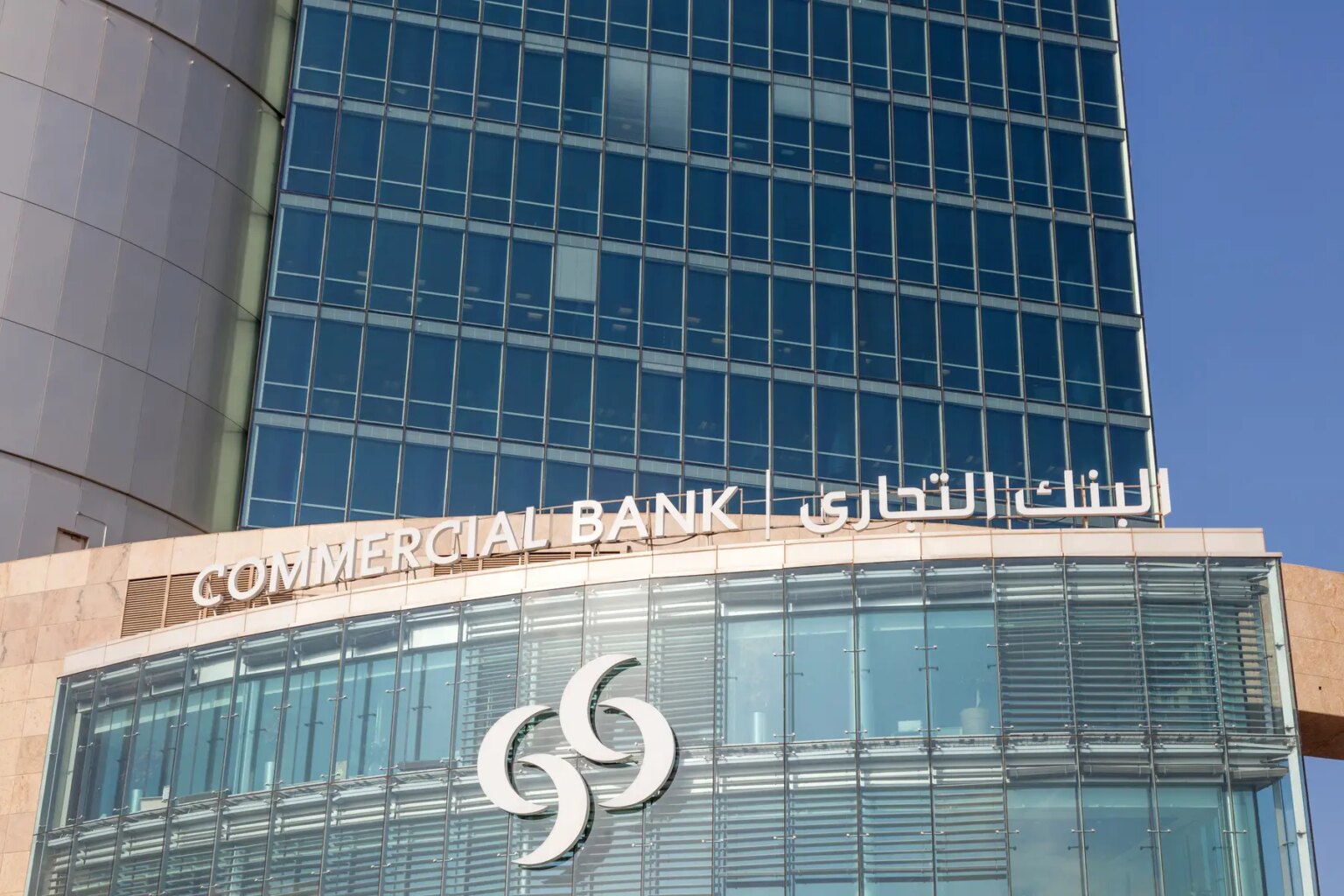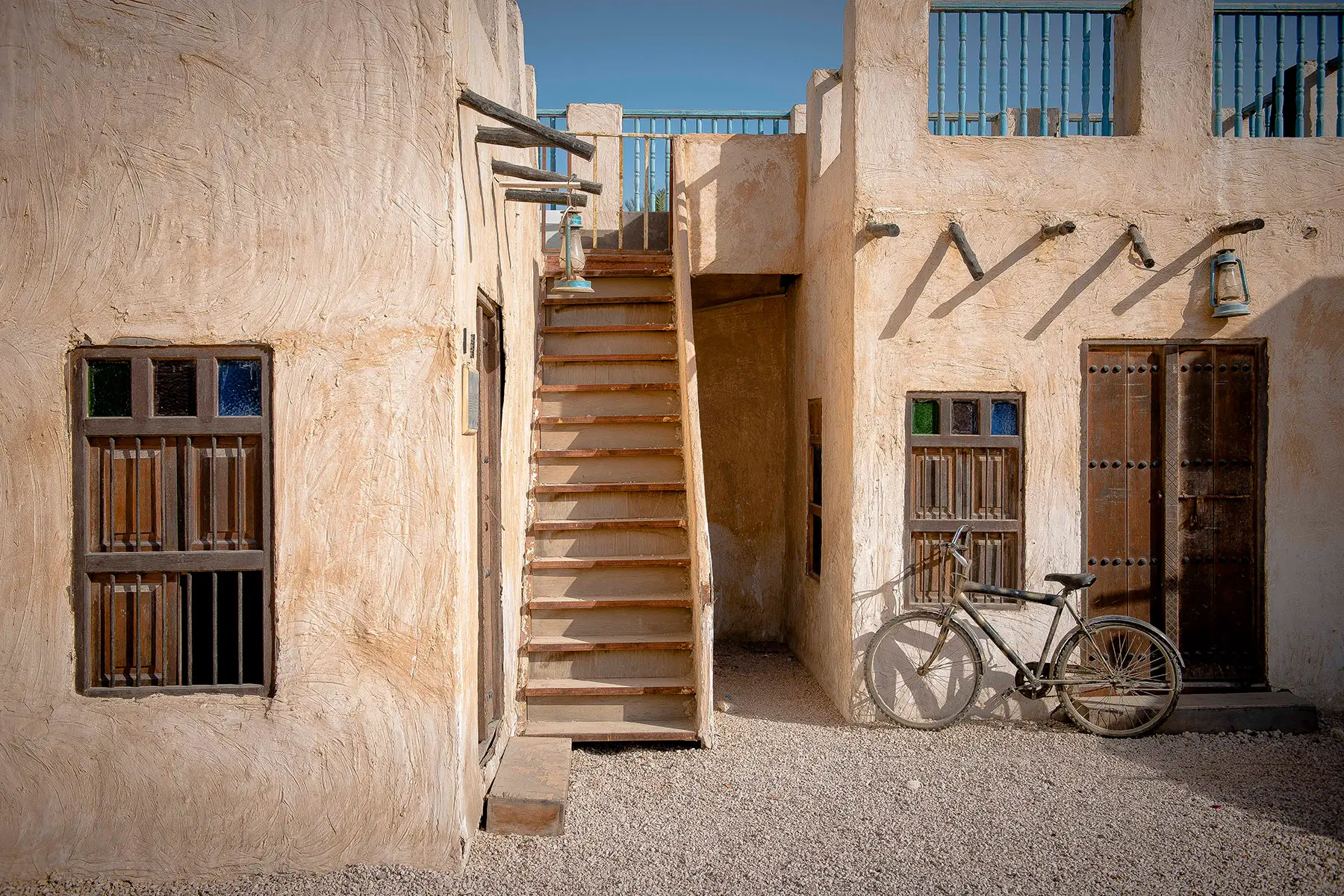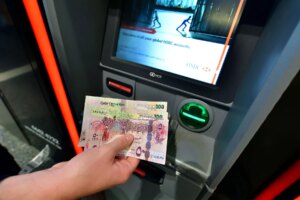As an expat, you will find opening a bank account in Qatar relatively easy. The country’s high expat population means that local banks understand the needs of foreign workers and cater to them accordingly. That said, there are certain documents you will need to provide, principally as a safeguard for the bank, but also to prove your own identity and legal status.
This guide includes the following information:
- An overview of banking in Qatar
- Do you need a bank account in Qatar?
- Before you open a bank account in Qatar
- Types of bank accounts in Qatar
- Bank accounts in Qatar
- The main banks in Qatar
- How to open a bank account in Qatar
- Types of banking services in Qatar
- International money transfers in Qatar
- Managing your bank account in Qatar
- Changing banks or closing a bank account in Qatar
- Banking fees in Qatar
- Making a complaint about banks in Qatar
- Useful resources
An overview of banking in Qatar
There are 18 licensed banks in Qatar, 11 of which are Qatari financial establishments and seven are foreign institutions. Qatar National Bank (QNB) is the country’s largest commercial lender by profitability, deposits, and assets. It has a market share of more than 55% of banking assets of all banks in Qatar. Qatar Islamic Bank is the largest Islamic bank in the country, with 40% of total Islamic banking assets.
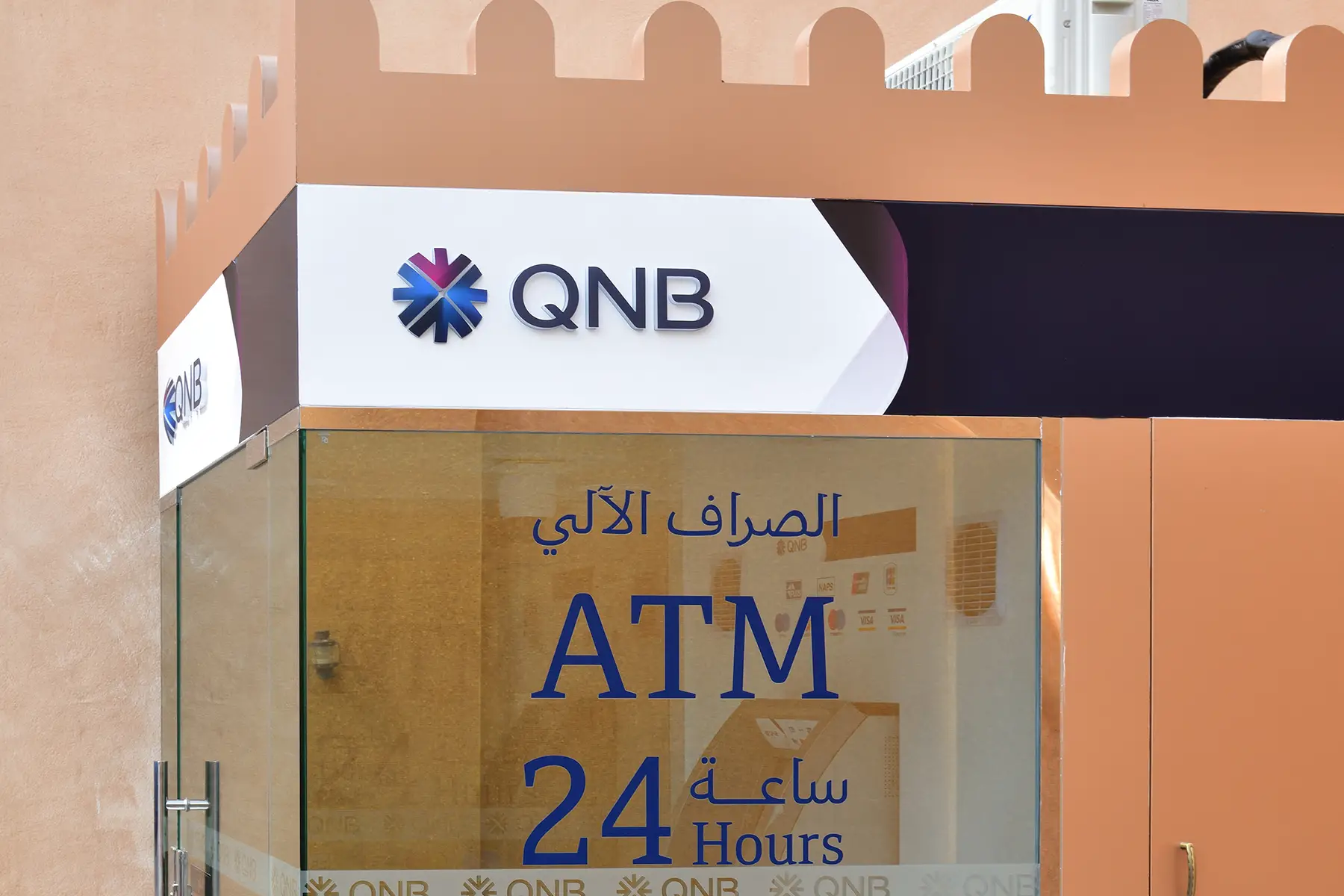
Banks in Qatar are regulated by Qatar Central Bank (QCB), which was founded in 1973 as the Qatar Monetary Agency. Its role is to supervise banks and financial institutions, manage monetary policy, oversee the financial and insurance systems, and maintain the strength of the country’s banking system.
According to KPMG, the environment around banking in Qatar is constantly evolving. Consequently, local financial institutions will need to increase their focus on international reporting protocols, regulatory compliance, forthcoming VAT implications, digital transformation, mitigating fraud, and cybercrime risks. Furthermore, they will need to facilitate a corporate governance culture to benefit all stakeholders in order to successfully navigate through this environment.
Overall, banks in Qatar are easily accessible to people living anywhere on the peninsula. There are 7.2 bank branches and 65 ATMs per 100,000 adults in this country of 2.6 million people. All banks operating in Qatar offer services in English and Arabic.
Do you need a bank account in Qatar?
Expats working in Qatar will need to open a bank account quickly; the country’s wage protection system stipulates that all workers employed there must have their salaries and wages paid into a Qatari bank account in Qatari riyals. Most noteworthy, banks in Qatar are among the most modern in the Middle East. Customers can open an account simply upon walking into a branch, although some documents are required.

You may be able to manage your money using an overseas account if you can get your employer to transfer the money to your international account. However, in most cases, you will benefit from having a local bank account in Qatar. Furthermore, local bank accounts also ease the process of obtaining credit cards and taking out a home or car loan in Qatar.
Before you open a bank account in Qatar
In general, opening a bank account in Qatar is quick and efficient, but with some banks, this may take a couple of days. Therefore, it is advisable for new expats to budget enough cash to last them a few days in order to pay for daily expenses. It’s easy to withdraw cash using an international bank card at any ATM in Qatar, but expect to be charged for the transaction; up to QAR20. You will also be able to use an international credit or debit card for larger purchases (above QAR25). Taxi drivers and small retailers such as grocers may ask for cash, however.
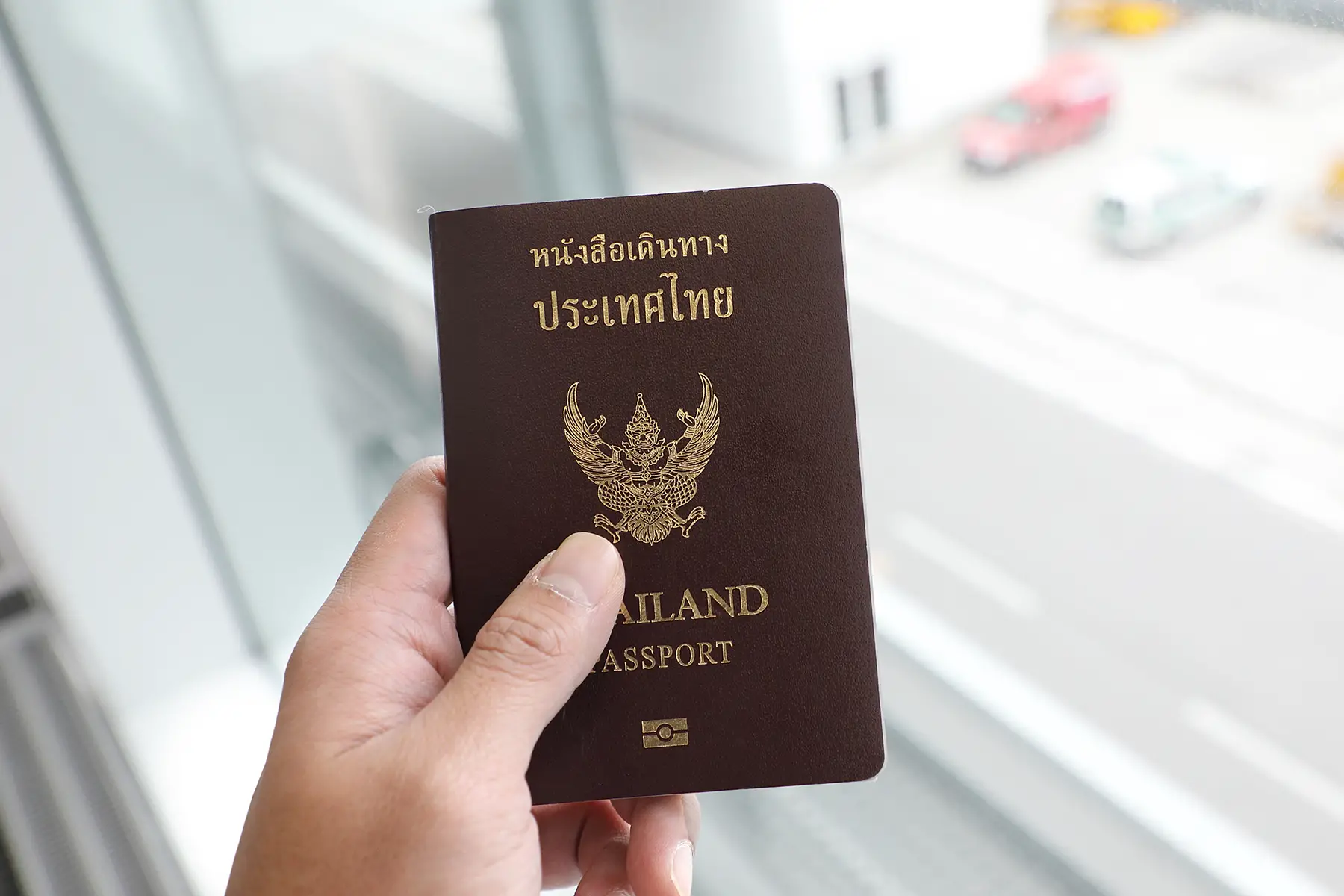
Opening a bank account in Qatar before you arrive is certainly possible, and big banks such as the Commercial Bank Of Qatar and QNB allow new customers to open online accounts. However, in order to support an online application, you will likely be required to provide documentation such as a copy of your passport photo page and a letter from your employer in Qatar. Once you arrive in the country, you will then have 90 days to present your local Qatar ID to the bank.
Non-residents are only able to open bank accounts in Qatar at certain banks, however, these carry hefty minimum balance requirements.
Types of bank accounts in Qatar
Expats banking in Qatar can expect their financial institutions to offer a range of bank accounts for everyday use. These include:
Standard accounts
Current accounts: Available as single or joint accounts, current or checking accounts come with checkbooks, debit cards, and monthly statements. They may be subject to minimum balance requirements.
Savings accounts: Expats banking in Qatar can open savings accounts that are accessible via online banking. They come with debit cards and usually offer unlimited mobile, online, branch, and ATM access. Such accounts typically have no monthly account fees, and usually offer a higher interest rate than current accounts.
Bespoke accounts
Ladies’ accounts: Many banks in Qatar offer banking services for women via specially designated bank accounts; these can be accessed at special ladies’ branches in some cases.

Children’s accounts: Expat parents may open bank accounts in Qatar for children under the age of 18. They typically carry restrictions on the number of transactions possible and have balance requirements such as a minimum of QAR5,000.
Offshore accounts
Expats living in Qatar may find that opening an offshore bank account is the best way to manage their finances. Aside from extremely cheap money exchange fees or no fees at all, an offshore account has low taxes and, in most cases, offers a multi-currency debit card, which is perfect for a world citizen. Other benefits that an offshore account can offer are complete transactions in several different currencies; full access regardless of where in the world you are; and 24-hour access and assistance. Some banks provide offshore bank services, but the type of account might vary. In Qatar, you can find this service in HSBC Qatar, PNB Paribas, and Standard Bank. You can read more in our guide to banking in Qatar.
Expats and business owners
New to Qatar account: Banks such as Commercial Bank of Qatar offer special accounts for new expats. On their websites, CBQ says it can open such accounts before expats move to the country, doing away with the need for upfront documents such as residence permits.
Business banking: Banking solutions for those who have their own companies in Qatar are generally restricted to bank account services.
Loans and investing
Loans and overdrafts: Customers banking in Qatar can take out personal loans easily, whether to buy a car or a home or to consolidate debt. Most banks also offer short-term and long-term overdrafts.
Mortgages: With Qatar’s property market now open to expats and foreigners, most banks now offer mortgages to expats and foreigners who meet their criteria. However, the mortgage sector is still maturing, so shop around before signing on the dotted line.
Investment accounts: Many retail banks in Qatar offer investment accounts for expats. High-net-worth individuals also have access to investment banks within the region, such as BNP Paribas, Credit Suisse, Goldman Sachs, JP Morgan, KKR, Société Générale, and UBS. Minimum balances apply when accessing investment banking in Qatar.
Bank accounts in Qatar
If you want to open a bank account in Qatar, you will find yourself presented with a range of different banking partners to choose from. Before you settle on one, though, you may want to shop around to compare products and services across different banks and find one that meets all your requirements; for example, when it comes to transferring money abroad. Your employer may also have a preferred banking partner and you may be asked to choose the same bank for your salary account. Doing so means that your salary in Qatar is available to you on the day it is transferred.
The main banks in Qatar
Some of the options available to expats when opening a bank account in Qatar are listed below. All have internet and mobile banking services and offer phone banking options around the clock:
Local banks
Qatar National Bank: As the largest commercial bank in Qatar, QNB has a market share of more than 55% of all banking assets in the country. Established in 1964, the publicly listed bank is also the largest bank in the Middle East and Africa region. QNB employs over 28,000 people and operates an extensive network of 1,200 branches and 4,300 ATMs.
Commercial Bank of Qatar: The third-largest bank in Qatar in terms of total assets, CBQ was founded in 1975. It has wholesale and retail banking divisions that are operated by over 2,250 employees. CBQ manages 29 branches and 179 ATMs nationwide.
Doha Bank: As one of the most international commercial banks in Qatar, Doha Bank has international branches in Dubai, Abu Dhabi, Kuwait, and Mumbai as well as representative offices in Australia, Singapore, Canada, Germany, Japan, China, Hong Kong, South Africa, South Korea, and the UK. Doha Bank operates a retail network of 27 local branches, nine e-branches, and 110 ATMs.
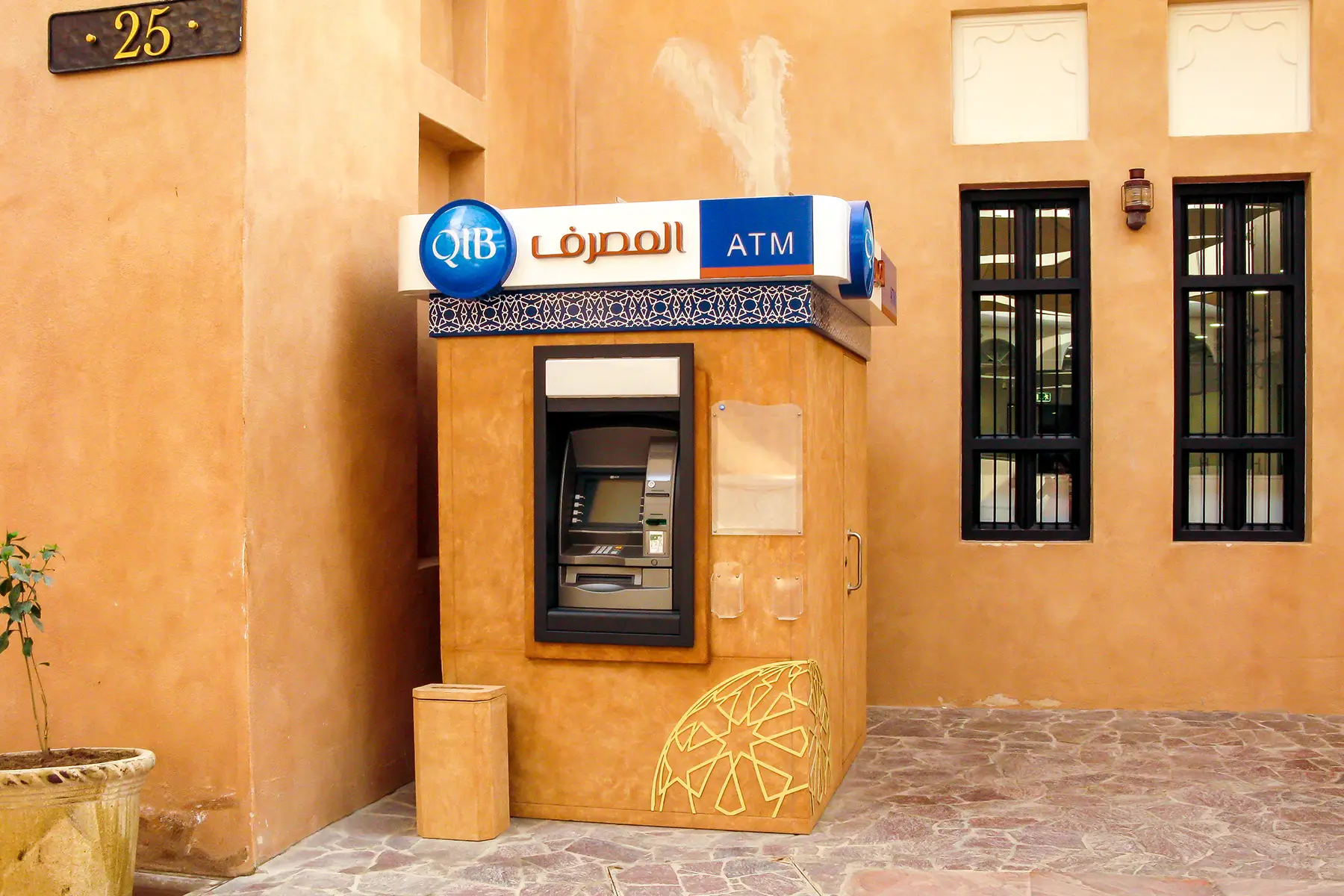
Qatar Islamic Bank: The Arabian Gulf is a major center for Islamic banking, and there are several Islamic banking providers in Qatar offering retail banking services in line with Sharia principles. The first Islamic financial group is Qatar Islamic Bank (QIB), today the second-largest bank in the country by assets. Incorporated in 1982, it now holds an Islamic banking market share of over 40%. As of March 2019, QIB had total assets of $42.7 billion. It has 30 branches in Qatar and employs approximately 1,000 people.
HSBC: Operating on the peninsula since 1954, it is a subsidiary of HSBC Bank Middle East Limited and offers business, corporate, and commercial bank accounts in Qatar. The bank has three branches in Doha and offers a network of ATMs at 11 different locations.
How to open a bank account in Qatar
Opening a bank account in Qatar is a quick and easy process. You will need to have a few documents on hand, however, which vary depending on the kind of account you want to open.
As an expat in Qatar, the basic requirements for opening a personal savings or current account are:
- Your original passport plus a copy;
- A copy of your visa page proving you are a legal resident;
- An official employment letter from your Qatari employer (or sponsor) stating your salary. It will need both a signature from you and from your employer. (You won’t need this for a savings account that requires a minimum balance);
- Two passport-sized photographs;
- A filled-out and signed bank account application form;
- Qatar ID (some banks may ask for this)
If you are opening a bank account in Qatar for your wife or children, you are in effect their sponsor, so you will need to provide the sponsor’s letter.
How to open a business bank account in Qatar
Opening a business bank account in Qatar requires more stringent documentation procedures than with residential accounts. It can take up to four weeks before your business bank account is open and operational. You will require the following documents:
- Company trade license
- Certificate of registration
- Share certificates
- Company memorandum and articles of association
- Board resolution empowering a company officer to open the account
- Passport and residence visa copies for shareholders and authorized signatories
What to do if you are refused a bank account in Qatar
If your company isn’t listed with the CBQ, you might be refused a bank account. You may also be denied a bank account if you have a criminal record, or are on an international restricted or wanted list of some kind. Another bank might block your account because of suspicious activity or if you can’t confirm a source of funds when asked.
American citizens who refuse to sign the self-certification form as mandated by FATCA law may also be refused banking services in Qatar; this depends on each bank’s discretion.
However, if you are denied a bank account, you can escalate the matter to the QCB. You can lodge a complaint via a phone call, letter, or in person.
Types of banking services in Qatar
Qatar, like the UAE, has embraced modern payment methods, and you will find it easy to pay with credit and debit cards in the country. Consequently, banks in Qatar offer a range of payment cards with different benefits such as air miles, so it’s worth comparing these in advance.
You can choose to go with your current bank when buying these services or establish a relationship with a new bank. Many services are restricted by salary transfer accounts, so you will want to ask about these.
Cards, checks, and direct debits
Payment cards: Debit and credit cards only account for about 45% of transactions in Qatar, although there has been a significant push for more businesses to accept them.
Checks: Checks remain prevalent in Qatar, where landlords often ask tenants for post-dated ones. Local checks clear within a couple of days, but acceptance at ATMs varies from bank to bank. Some banks lead the market: CBQ offers a service that allows remote cheque disposal for companies, whereby a customer need only scan or photograph a cheque and upload it through the bank’s mobile app. Be aware that bounced checks are a serious issue in Qatar.
Direct debits and standing orders: Those banking in Qatar can use direct debits and standing orders to pay utility bills and mobile phone charges. Direct debits are also in wide use across the peninsula.
Digital and mobile
Online and mobile payments: Most e-commerce operators offer credit and debit card services to pay bills or make purchases, but many consumers still prefer cash on delivery.

Digital wallets: E-wallets have been slow to come to Qatar. Neither Apple Pay nor Google Pay is available in the country as of 2019, but local operators such as Ooredoo and Noqoody offer such platforms for expats in Qatar.
Money transfers
Local money transfers: Expats banking in Qatar will be able to transfer money between banks easily. You can expect the process to take a couple of days, but some banks might ask for extra verification.
International money transfers: Thanks to relationships with correspondent banks, a range of banking providers in Qatar offer easy money transfer services between different countries.
Loans
Car loans: Car loans are easily available in Qatar, which has a strong driving culture. Depending on the bank, expats may or may not be asked for a down payment on a car loan. A 15% down payment is considered the industry standard when taking a loan from a bank where you aren’t transferring your salary. The maximum repayment period is usually 60 months or five years.
Personal loans: Banks in Qatar offer expat residents personal loans in a variety of different ways, such as cash loans on credit cards, or more usual bank transfers. Some banks in Qatar impose a maximum ceiling of QAR 400,000 for expatriate personal loans. Typical repayment periods stretch to 48 months.
International money transfers in Qatar
The country’s large expat base means that international remittance services are available to all consumers when banking in Qatar. The QCB, for instance, allows customers to send money to accounts back home within 60 seconds. Expats can transfer money by visiting a bank branch, by using online banking services, and in certain cases, from ATMs.

Many local banks have correspondent or partner relationships with institutions in other countries. So depending on where you want to move your money, it’s worth asking about these.
There are several other ways to transfer money to other countries such as money exchange companies with branch counters at different malls. These are often cheaper. In addition, there are several online services that offer low rates. These include:
Managing your bank account in Qatar
Before opening a bank account in Qatar, it’s worth checking what services are available to you. In general, expats can rely on mobile and internet banking, but not all banks offer these.
- Digital and online banking: Internet banking in Qatar is widely available through most banks to customers who want a more convenient way of keeping track of their finances.
- Mobile banking: The main banks in Qatar now offer mobile banking apps so that customers can access accounts and make payments from their mobile phones and tablets.
- Phone banking: Many banks have automated phone banking services, which allow customers to check their balances, get details on your recent transactions, transfer funds, and pay credit card bills.
- Face-to-face: For those who prefer to go to the branch, several financial institutions in Qatar have service counters at prominent malls and other locations around the country to better reach their customers. Appointments are usually not required.
Changing banks or closing a bank account in Qatar
It’s easy to change banks in Qatar, you will just need to provide the same documents at the new bank. However, you will need to settle all existing debts at the first bank before you can transfer to a new one.
You will need to give the new bank a ‘letter of no liability’ after closing your loans at the old bank, as well as an employer’s letter regarding transferring your salary to the new bank. On the other hand, the new bank may issue a manager’s cheque for the amount required to settle all debts with the current bank. Once this is done, your liabilities can be transferred to the new bank. If you are looking at taking new loans, you will most likely need to reassign your salary to the new bank.
The time scale for closing an account
When you want to close a bank account in Qatar, you need to start the process 30 to 45 days in advance. You could be stopped at the border if you have debts against your name. In addition, some employers may inform the bank that you have resigned, at which stage your account may be frozen if you have outstanding loans to be repaid.
You will need to visit the branch in-person to close your account. It’s important to ask for a no-liability letter, confirming that the account has been closed and all debts settled. However, if you close a bank account in Qatar within a year of opening it, you may be charged a fee.
Banking fees in Qatar
Fees for accessing different services when banking in Qatar vary from bank to bank. You will find that charges for many transactions are cheaper when they are carried out online, while branch requests may be billed at a higher rate. All banks in Qatar are required to advertise these charges on their website, to display them prominently at branches, and communicate them to their customers.
Typical fees for a resident expat’s bank account in Qatar are as follows:
| Account opening fees | None |
| Monthly minimum balance penalty | Usually none |
| Using a GCC bank’s ATM in Qatar | QAR10 |
| Cash withdrawals at bank branches in Qatar | QAR10 (for withdrawals under QAR1,000) |
| New checkbook (the first is free) | QAR15 |
| Stop payment on lost checks | QAR25 |
| Returned check due to insufficient funds (first time) | QAR100 |
| Transfers to other local banks | QAR25+1% of the transfer amount |
| Lost debit card | QAR50 |
| Certified account statements, requested at branches | QAR10-25 depending on the period |
| Balance certificate | QAR25 |
| No-liability letter | QAR25 |
| Account closing fee (within the first year) | QAR50 |
Making a complaint about banks in Qatar
The QCB’s Banking Customer Services Protection Department aims to protect the rights of its customers by ensuring they have the right to transparent and fair banking transactions; with access to all financial services and products at appropriate costs. However, the QCB puts the onus on handling complaints on the banks themselves.
In case of complaints when banking in Qatar, you are requested to first route queries to the concerned financial intuition. If the complaint is not solved, you will need to send a complaint through the QCB website, by filling in the e-complaint form. In addition, you need to attach a copy of the supporting documents. QCB says it will do its best to solve the problem within seven working days.
Consumers may telephone QCB during normal working hours or e-mail them. More information is available on the QCB website.
Useful resources
- Qatar Central Bank (QCB)
- Yallacompare – a comparison website
- Qaren – a comparison website
